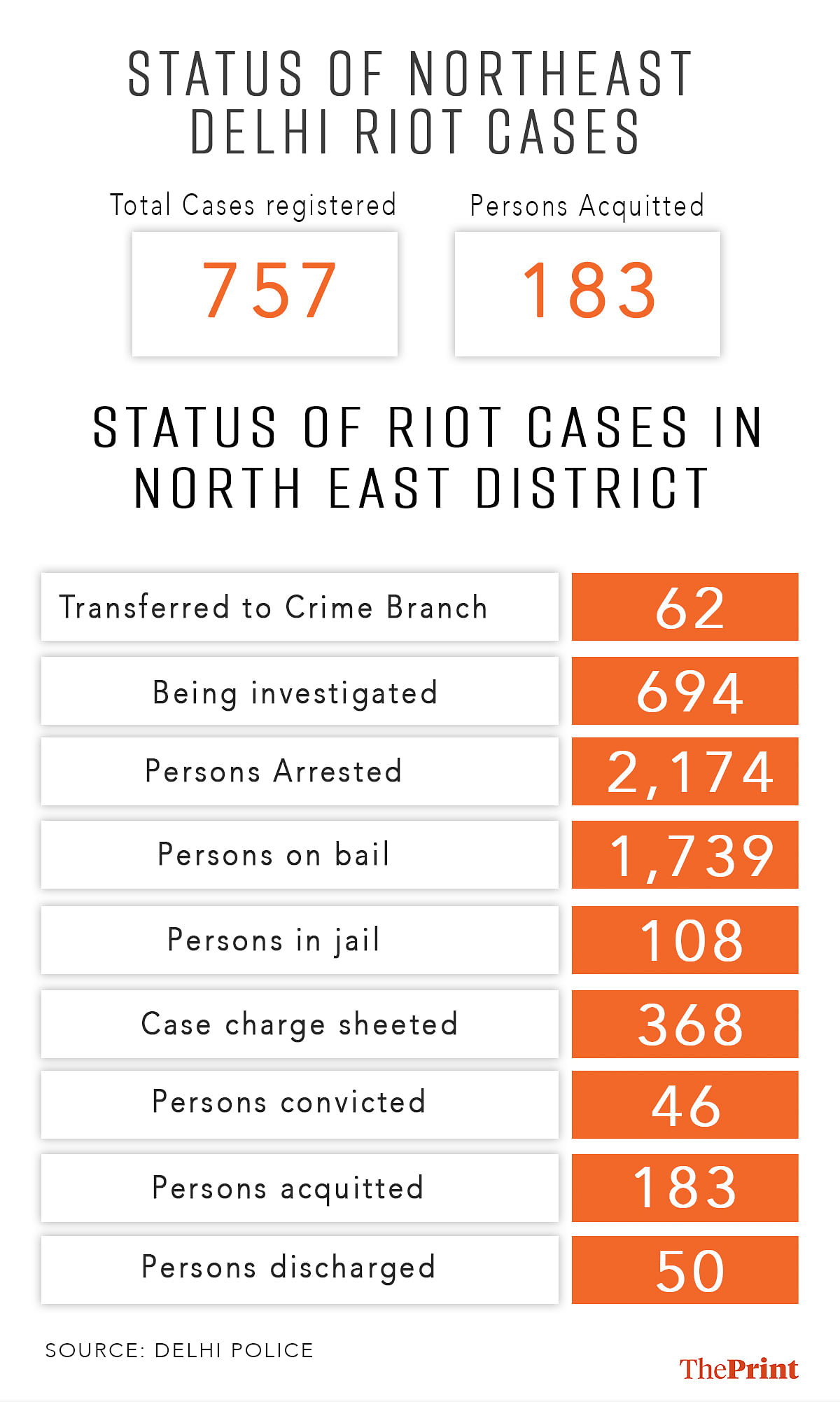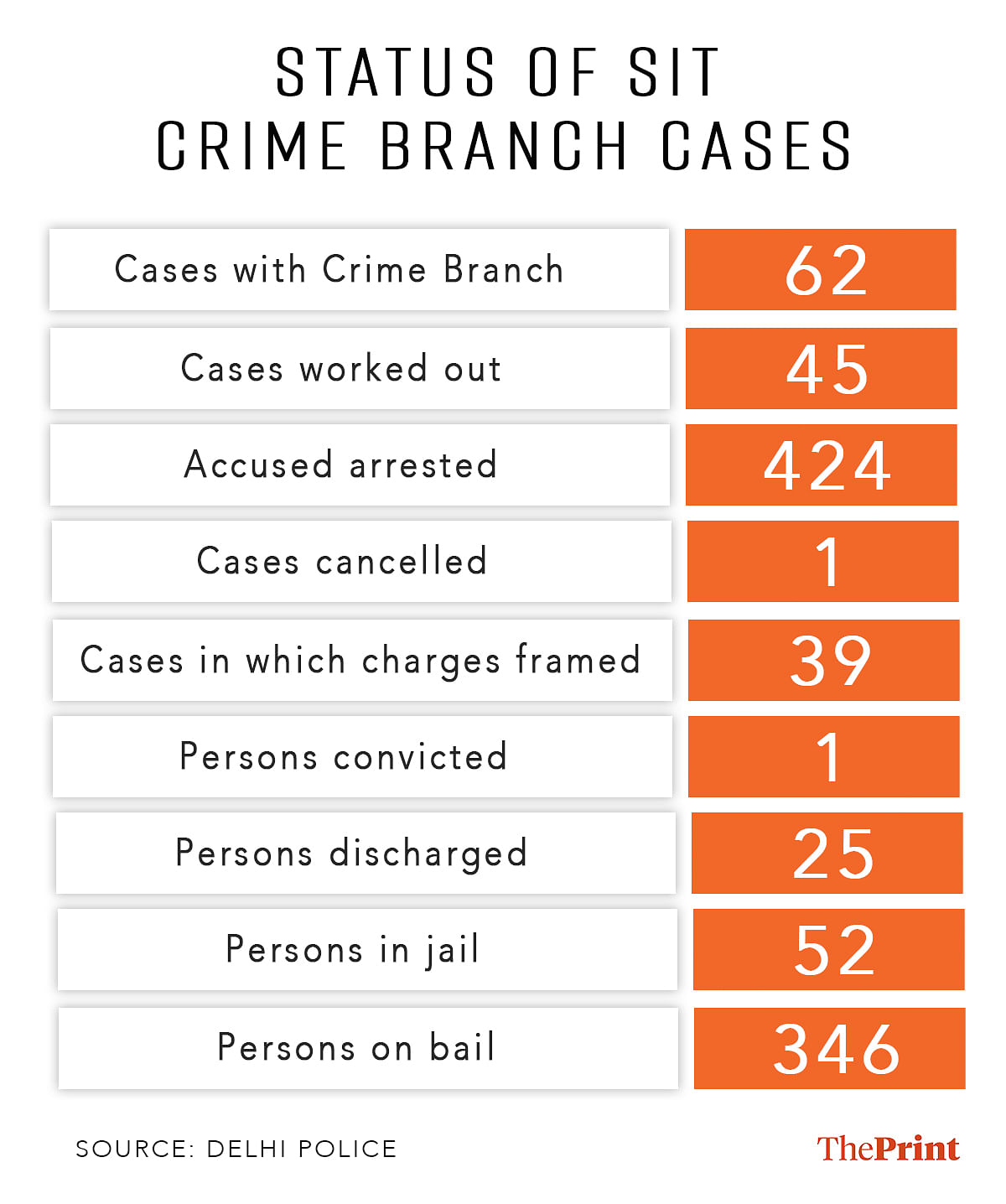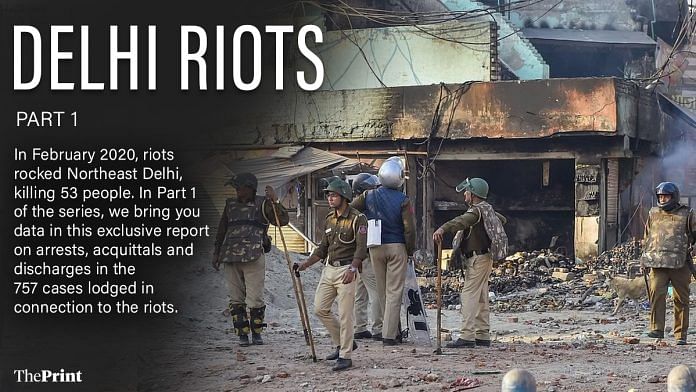New Delhi: Four years since the northeast Delhi riots left 53 people dead, 183 persons have been acquitted and 75 discharged in 757 cases registered in connection with the violence, ThePrint has learnt.
The reasons for these acquittals and discharges cited by courts included inconsistencies in versions of complainants, faulty charge sheets, lack of witnesses, “artificial statements”, among others.
According to police data exclusively accessed by ThePrint, of the 757 cases lodged, 63 cases were transferred to the crime branch, while one “larger conspiracy” case was registered by the Delhi Police Special Cell. One case with the crime branch was also cancelled, which is done when the investigating team doesn’t find concrete evidence to continue its probe. Around 2,600 arrests were made in total in the riots cases, however, the total number of accused is unclear as many were booked in multiple cases.
Among the 694 cases under probe by the Northeast District, charge sheets have been filed in only 368, or 53 percent of the cases.

In these cases, a total of 2,174 persons were arrested, of which 1,739 persons were granted bail and 108 are in jail. The rest include juveniles.
However, after four years, while 50 people have been discharged in the cases with the Northeast district police, 46 have been convicted. Data shows that all the 183 acquitted so far were accused in these cases.
A court discharges an accused in a case when it finds lack of evidence even to frame charges. Only once charges are framed can the matter go to trial. An acquittal is when a court lets off an accused at the end of trial.
Similarly, in the 62 cases with the crime branch, only 45 cases have been worked out. A case is considered to be worked out after the police have identified suspects.
While 424 persons were arrested in these 62 cases, charges have been framed only in 39 cases.

Moreover, of the 424 arrested, only one person has so far been convicted while 25 persons have been discharged by the courts. A total of 346 people are out on bail and 52 are currently behind bars.
Charges have been framed in the “larger conspiracy” case lodged by Delhi Police Special Cell — FIR 59, in which 21 persons were arrested including student activist and former JNU research scholar Umar Khalid. In this case, 12 people including Khalid continue to be in jail, while nine are out on bail.

The northeast Delhi riots broke out on 23 February 2020 and continued over two days. Mobs armed with rods and arms killed people, set homes and shops on fire, and vandalised several places of worship. The worst affected areas included Jafrabad, Welcome, Seelampur, Bhajanpura, Jyoti Nagar, Karawal Nagar, Khazoori Khas, Gokal Puri, Dayalpur and New Usmanpur.
Police sources said appeals have been filed against some of the discharges and acquittals in the riots cases in higher courts, but the exact number of appeals filed is unclear.
A senior Delhi police officer told ThePrint, on condition of anonymity, “The probe in the riots cases have been conducted meticulously with the help of scientific methods. Scientific evidence is an important part of these cases. Over 900 video clips from CCTVs, other videos and dump data were screened. Facial Recognition System was also used to analyse the footage. The investigation in all cases has been impartial.”
Also Read: Judge transferred, HC to hear Delhi riots bail pleas from scratch after months of hearings
‘Erroneous charge sheet, exploiting evidence’
Various Delhi courts have repeatedly pulled up the Delhi Police for “callous” investigation, “erroneous charge sheet” and “exploiting evidence”. In 2021, a Special Investigating Cell was formed after the courts came down heavily on the national capital’s police to “expedite and streamline the investigation” into the Delhi riots cases.
In August last year, a Karkardooma court had slammed the Delhi Police while discharging three persons in a riots case. Calling the investigation “shoddy”, the judge said the investigating team had filed the charge sheet in a “predetermined” and “mechanical manner”.
“I have suspicion for the IO (investigating officer) having manipulated the evidence in the case, without actually investigating the reported incidents properly,” additional sessions judge Pulastya Pramachala had said at the time, discharging the accused.
“It was a rare kind of coincidence that all these different complainants suffered same kind of problem i.e. shock/trauma for reporting wrong date and time in their complaints and realising such trauma after around three years from making their respective complaints, in order to give a changed version of date and time of the alleged incidents,” the court observed.
Additional Sessions Judge Amitabh Rawat had in January 2022 also discharged six persons in a riots case, while noting that the only incriminating evidence against the accused provided by the investigating team is the “disclosure statements” made after the arrest.
In December 2022, a local court had also discharged Umar Khalid and United Against Hate founder Khalid Saifi in a case of stone pelting in the Chand Bagh area, citing lack of substantial evidence in the prosecution’s case.
In September 2021, a Delhi court had, while discharging three persons including former AAP councillor Tahir Hussain’s brother Shah Alam in a riots case, noted that “the evidence brought on record by the investigating agency in the case miserably falls short for framing charges against the accused”.
“When history will look back at the worst communal riots since Partition in Delhi, the failure of the investigating agency to conduct proper investigation by using latest scientific methods, will surely torment the sentinels of democracy,” additional sessions judge Vinod Yadav had observed.
Judges have also pulled up the police over investigating officers not briefing the public prosecutors adequately for trial.
On the 2021 unit formed to streamline the investigation into the riots cases, the Delhi police officer quoted earlier said, “The team is working on course correction, to understand loopholes and fix them in order to ensure that the charge sheet and evidence are watertight.”
Also Read: ‘Pune IS module’ suspect was in touch with 2020 Delhi riots accused Sharjeel Imam, say Delhi Police
‘Focus was on proving a narrative’
Some of the lawyers representing accused in the riots cases told ThePrint that the arrests were made hastily and the focus on proving the narrative that there was a larger conspiracy had resulted in poor investigation.
“This was an attempt to hush the CAA NRC protest which had attracted the attention of the entire world. In this process, corrupt police officers falsely implicated a large number of Muslims. Ultimately, when faced with the judicial process, the entire narrative is falling flat on its face and repeated judicial pronouncements of false implications of the Muslim community and cooking up evidence against them by the police,” said advocate Mehmoud Pracha.
Senior advocate Rebecca John said, “The police were in a rush to show that a large number of people were involved in the riot and in this hurry, the investigating teams named random people and created evidence. They gave names of people just because they resided in a particular area and this doesn’t necessarily mean that they committed any violence.”
She further said: “There was no scientific investigation. Conspiracy theories like the Left-liberals caused the riot were relied upon and in this process, the police, whether deliberately or otherwise, couldn’t actually come down on the actual perpetrators. The entire focus was to prove the conspiracy and bring big activists and names into the net, resulting in substandard investigations. This has affected the actual cases of murder, arson and damage to property.”
This is the first in ThePrint’s series on arrests, acquittals & discharges in Delhi riots.
(Edited by Gitanjali Das)




entire nation knows very well its the delhi police and they work only for the ruling central bjp party… not for aap party!! and these same police are so communal minded that they only target muslims each time… the meaning of police has completely been changed… instead of safeguarding public irrespective of religion or caste or creed, and being servants of public, they act as as if they’re the bosses…. most of the places in the country its the same attitude of police.. highly corrupt, highly communal.. most of the policemen on duty are drunk..